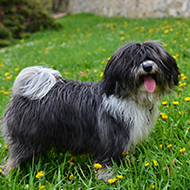New DNA testing scheme for Tibetan terriers

The new scheme tests for pituitary dwarfism in the Tibetan terrier.
The Kennel Club has announced a new DNA test reporting scheme for pituitary dwarfism in the Tibetan terrier.
Launched following consultation with the breed’s health coordinator, on behalf of the breed clubs, the results of the test will be recorded with the abbreviation 'DP-LHX3'.
“The Kennel Club constantly reviews DNA testing schemes in conjunction with breed clubs to ensure that breeders are supported with resources which help them to make responsible breeding decisions,” said Dr Joanna Ilska, genetics & research manager at The Kennel Club.
“The Kennel Club works alongside breed clubs and breed health coordinators in a collaborative effort to improve the health of pedigree dogs and is happy to consider a club's request to add a new DNA test to its lists. A formal request from the breed's health coordinator or a majority request from the breed clubs is normally required to do this.”
Pituitary dwarfism is an inherited disease caused by insufficient amounts of growth hormone in the body. Puppies with the condition may not be noticeably different at birth, but their growth will not follow the usual pattern, and they can die at a young age.
Owners of dogs with pituitary dwarfism may notice their dogs are smaller than others of the same breed and that they may remain puppy-like in looks. Affected dogs may retain their soft puppy coat, experience hair loss or have problems with tooth development.
Dogs tested for the condition will be recorded on the Kennel Club systems as one of the following:
Clear
The dog does not have any copies of the abnormal gene associated with the disease. The dog is highly unlikely to be clinically affected and will only pass on a normal copy of the gene to a puppy.
Carrier
The dog has one copy of the normal gene and one copy of the abnormal gene associated with the disease. The dog is highly unlikely to be clinically affected but may pass one copy of the normal gene, or one copy of the abnormal gene onto a puppy.
Affected
The dog has two copies of the abnormal gene associated with the disease. The dog will likely be clinically affected by the disorder and will pass one copy of the abnormal gene to any potential offspring.
More information about which laboratories The Kennel Club can record results from - and which labs will send results direct to The Kennel Club - can be found at : thekennelclub.org.uk/DP-LHX3
Test results will be added to the dog’s registration details which will trigger the publication of the result in the next available Breed Records Supplement. Results will also be added to the Health Test Results Finder on The Kennel Club website.



 The latest
The latest